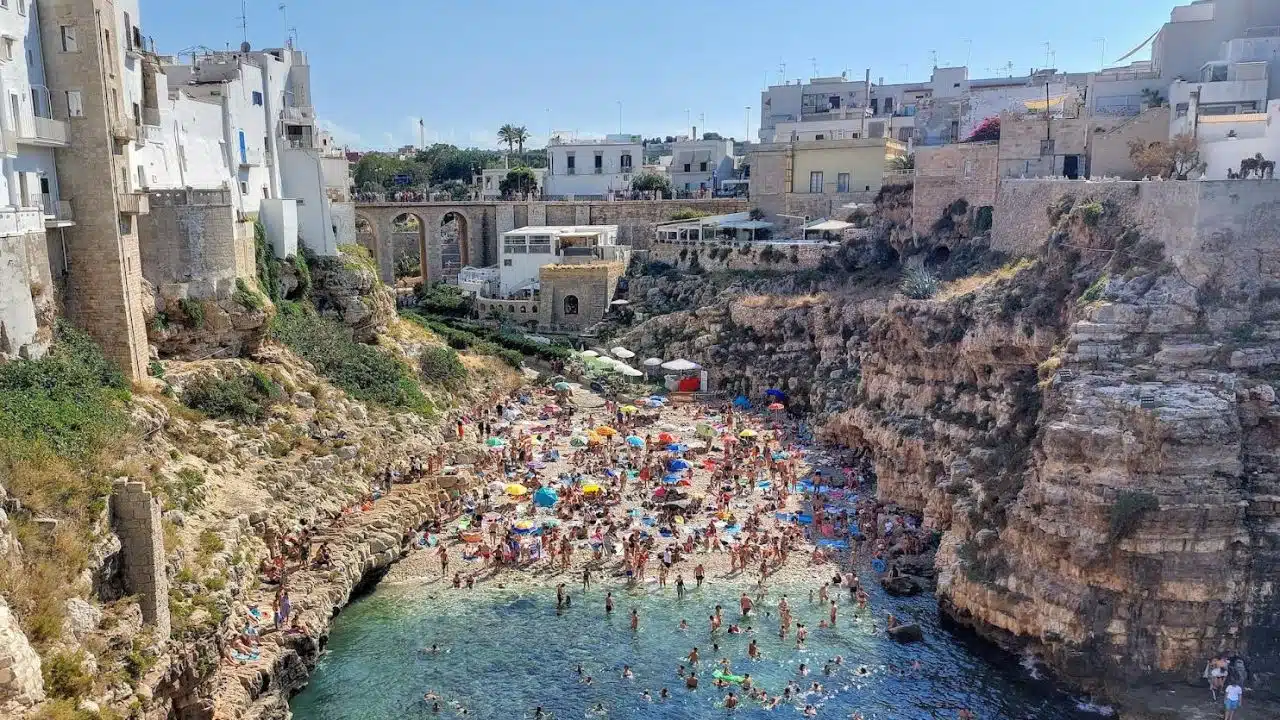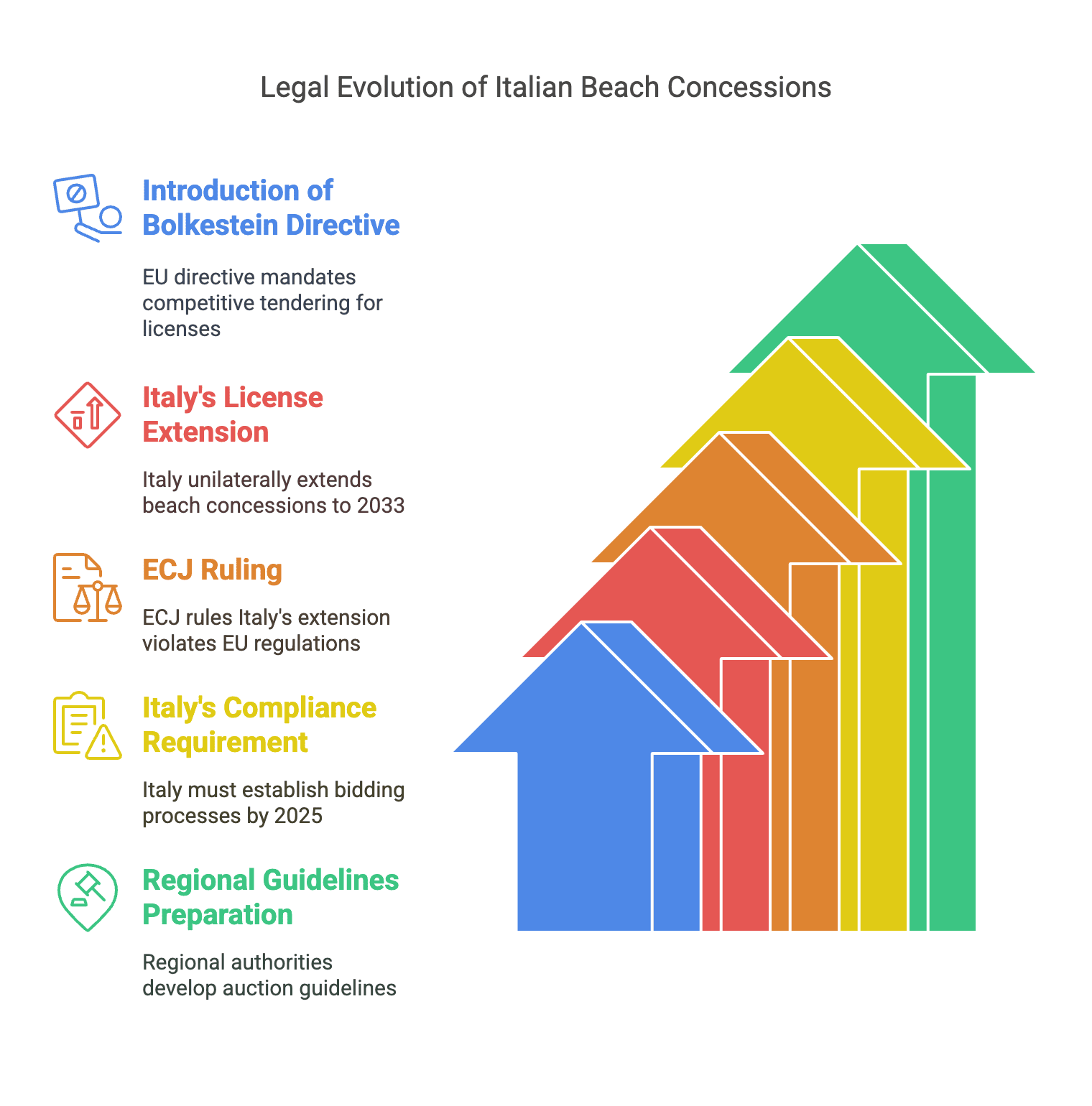Starting in 2025, Italy will commence the auctioning of its prized beach resort concessions. Opening these opportunities to competitive bidding while granting preferential treatment to current operators, this change in the game comes after years of legal disputes and mounting pressure from the European Union to comply with the Bolkestein Directive, which mandates transparency and fair competition for public contracts.
What’s Being Auctioned?
Brace yourself. This isn’t any ordinary auction – Italy is auctioning off beach resorts and coastal concessions.
With over 7,600 kilometers of coastline, and about one-third already under concession to private operators, Italy is filled with coastal paradises. The upcoming auctions will focus on reassigning or introducing new rights to operate resorts on unutilized or expiring concessions. Current operators will receive some advantages, such as preferential treatment in bidding or compensation for investments made, but the competition remains open to newcomers from across the globe.
To ease the transition, the Italian government plans to introduce compensation means for existing concession holders who previously lost their rights. These payouts aim to partially offset investments made over the years, though the exact sums depend on the extent and value of improvements made to the facilities.
State-owned Properties and their Rules for Concessions in Italy
Italy’s beach resorts are a prime example of how state-owned properties are managed under the country’s legal framework. State-owned enterprises serve a direct public function, ensuring access to coastal areas while being subject to special legal constraints. The Italian legal system classifies these assets as beni demaniali, meaning they are public assets that must belong to state-owned entities such as the national government, regions, provinces, or municipalities.
The Legal Framework for Italian Beach Concessions
The legal debate surrounding beach concessions in Italy has evolved significantly since 2006, when the European Union introduced the Bolkestein Directive. This directive explicitly prohibits the automatic renewal of licenses for public resources, mandating instead open and transparent competitive tendering procedures aimed at promoting fair competition and equal market access.
Following prolonged periods of uncertainty, characterized by repeated extensions and legislative delays, a crucial turning point occurred in 2023. The European Court of Justice (ECJ) ruled definitively that Italy’s unilateral extension of beach concession licenses through to 2033 breached EU regulations.
As of 2025, the Italian government has been compelled to establish clear rules and regional bidding processes in order to comply with European legal standards. Failure to adequately address these EU requirements could result in significant financial sanctions.
In this new legal landscape, regional authorities have begun preparing comprehensive guidelines to manage transparent and competitive auctions, detailing stringent criteria related to property evaluation, compensation for former concession holders, and the promotion of sustainable practices along Italy’s coastline. The transition towards a compliant regulatory framework remains challenging, yet essential to avoiding economic repercussions and fostering a fair and open market in Italy’s vital tourism sector.
Where are Italian bagni and beach resorts located?
Italian stabilimenti balneari [or bagni] are widespread in regions like Veneto, Toscana, Lazio, Emilia-Romagna. Also beach resorts are similar, but the term resort in Italy refers to a more luxurious context, unique attractions that can be found throughout the country, the most beautiful are located in Sardegna, Puglia.
However you can find Italian beach resorts on both sides of its coastline. In the Tuscan Maremma, you’ll find luxury resorts in Feniglia, Punta Ala, Argentario. Meanwhile, more southern regions like Sicily and Calabria offer renowned turquoise waters, unspoiled and regulated pristine beaches and of course a very rich cultural heritage.
Here are some Italian beach resort hot spots:
- Tuscany: Forte dei Marmi, Viareggio, Punta Ala, Isola di Elba
- Amalfi Coast: Positano, Ravello
- Sardinia: Spiaggia della Pelosa, Costa Smeralda
- Adriatic Coast: Rimini, Cattolica
- Puglia: Torre dell’Orso, Polignano a Mare
How to
The process of participating in auctions for beach establishments in Italy has unique features that require careful preparation and specialized legal assistance. This is particularly true given Italy’s diverse coastal landscape, where each region and local municipality implements specific regulations.
Italy’s coastline ranges widely from permanent and robust structures built in masonry and reinforced concrete, to temporary or semi-mobile constructions predominantly made from wood and lightweight materials. This distinction is significant, as it carries substantial economic and legal implications for those intending to participate in an auction.
In areas with permanent masonry structures, new buyers will be required to provide adequate compensation to previous concession holders, who have invested heavily in constructing and maintaining these buildings. This economic factor will significantly impact the auction’s financial evaluation; therefore, it is essential to have a clear picture of any potential additional costs involved.
In contrast, when structures are lighter and movable, these compensation requirements generally do not apply, making initial investments simpler and less costly.
To effectively approach this investment opportunity while minimizing bureaucratic or legal risks, it is highly advisable to engage a specialized Italian law firm.
With expert legal assistance, investors can gain a comprehensive understanding of the auction’s procedural aspects, necessary documents, timelines, and financial and fiscal implications of acquiring such properties. This informed approach increases the chances of making a successful investment within Italy’s beach concession landscape.




































